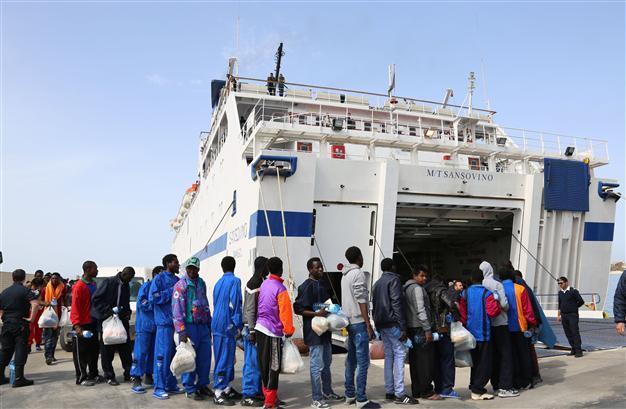700 migrants feared dead in Mediterranean shipwreck
ROME - Agence France-Presse

AP Photo
As many as 700 migrants were feared drowned April 19 after their packed boat capsized off Libya in what was described as the deadliest such disaster to date in the Mediterranean.The UN refugee agency (UNHCR) and Italy's coastguard said only 28 people had survived the wreck. Their testimonies suggested there had been about 700 people on board the 20-metre (70-foot) fishing boat, officials said.
"It seems we are looking at the worst massacre ever seen in the Mediterranean," UNHCR spokeswoman Carlotta Sami said.
The Maltese navy said it had received an alert about the stricken vessel around midnight (2200 GMT) on April 18.
The vessel was about 70 miles (126 km) off the Libyan coast and 110 miles (177 km) south of the Italian island of Lampedusa when it issued a distress call, Italy's coastguard said.
The coastguard instructed a nearby merchant ship to go its aid and it was when the Portuguese vessel arrived at the scene that the fishing boat capsized, most likely as a result of the terrified passengers stampeding to one side in their desperation to get off, the UNHCR's Sami said.
A total of 17 boats were in the area on April 19 morning, engaged in what appeared to be an increasingly fruitless search for survivors. Italy's coastguard said 24 bodies had been recovered from the waters around the site of the accident.
The tragedy is the latest in a growing catalogue of mass drownings of migrants attempting to reach the European Union on overcrowded, unseaworthy boats run by people smugglers who are able to operate out of Libya with impunity because of the chaos engulfing the north African state.
The most serious incident prior to April 19 occurred off Malta in September 2014. An estimated 500 migrants drowned in a shipwreck caused by traffickers deliberately ramming the boat in an attempt to force the people on board onto another, smaller vessel.
In October 2013, more than 360 Africans perished when the tiny fishing boat they were crammed onto caught fire within sight of the coast of Lampedusa.
That horrific tragedy was described at the time as a wake-up call to the world but 18 months later there is no sign of a let-up in the numbers attempting the perilous crossing in search of a better life in Europe.
The latest disaster comes after a week in which two other shipwrecks left an estimated 450 people dead.
If the worst fears about Sunday's tragedy are confirmed, it will take the death toll since the start of 2015 to more than 1,600 people.
More than 11,000 other would-be immigrants have been rescued since the middle of last week and current trends suggest last year's total of 170,000 migrants landing in Italy is likely to be matched, at least, this year.
Pope Francis on April 19 made a fresh appeal to European Union leaders to act to stem the loss of life off Italy's southern shores.
"They are men and women like us," he said in his weekly address to the Roman Catholic faithful in St Peter's square.
Aid organisations are calling for the restoration of an Italian navy search-and-rescue operation known as Mare Nostrum which was suspended at the end of last year.
Italy scaled back the mission after failing to persuade its European partners to help meet its operating costs of nine million euros ($9.7 million) per month amid divisions over whether the mission was unintentionally encouraging migrants to attempt the crossing.
Mare Nostrum has been partially replaced by a much smaller EU-run operation called Triton which has a fraction of the assets and manpower deployed by Italy.
The migrants seeking to reach Europe with the help of people smugglers are generally fleeing conflict or persecution in places such as Eritrea, Afghanistan and Syria, or poverty and hunger in sub-Saharan Africa and South Asia.
















